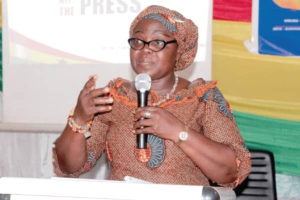Minister advocates for proper management of Ghana’s mineral resources

Madam Justina Owusu-Banahene, the Bono Regional Minister, is advocating a better management of Ghana’s mineral resources to provide a strong base for the livelihoods of the people.
She said proper mineral resource development could accelerate community growth and well-being in districts where local government authorities lacked the adequate capacity to provide employment opportunities for the youth.
Madam Owusu-Banahene was speaking at the opening of a two-day transformational dialogue on Ghana’s artisanal and small-scale mining at Fiapre in the Sunyani West Municipality of the Bono Region.
On the theme: “Sustaining Environmental Security and Human Rights in Small-Scale Mining Operational Areas in Ghana”, the programme brought together stakeholders to deliberate on the theme, identify the challenges and find possible solutions.
It was organised by the University of Energy and Natural Resources (UNER) and attended by politicians, traditional leaders, students and staff of the University, civil society actors, mining companies, artisans, and the media.
Madam Owusu-Banahene said large-scale multi-national mining companies operating in remote parts of the country had acted as substitutes for local governments in the provision of jobs, schools, hospitals and improved social welfare services.
Also, the Artisanal and Small-Scale Mining sub-sector of the economy had the potential to generate more direct and indirect local jobs, she said.
The 1992 Constitution mandates the state to control and exploit the lands, waters and natural resources but with permission to groups and individuals to explore and extract minerals in a more responsible manner to benefit the people.
The Regional Minister said the environmental implications of galamsey activities in Ghana had become a cause for concern, as research had shown that national efforts towards managing the Artisanal and Small-Scale Mining sub-sector would succeed through collaborative dialogue with all stakeholders.
The dialogue must be between governments, local stakeholders, mining associations, and higher educational institutions to provide a feedback based on which actions would be taken.
She, therefore, urged the universities to support in building the capacity of government officials to design and enforce viable environmental and development-sensitive mining policies.
These policies could include the transformation of post-mining sites to viable agricultural lands to provide sustainable livelihoods for rural communities even after the mining activities had ceased.
Source: GNA
